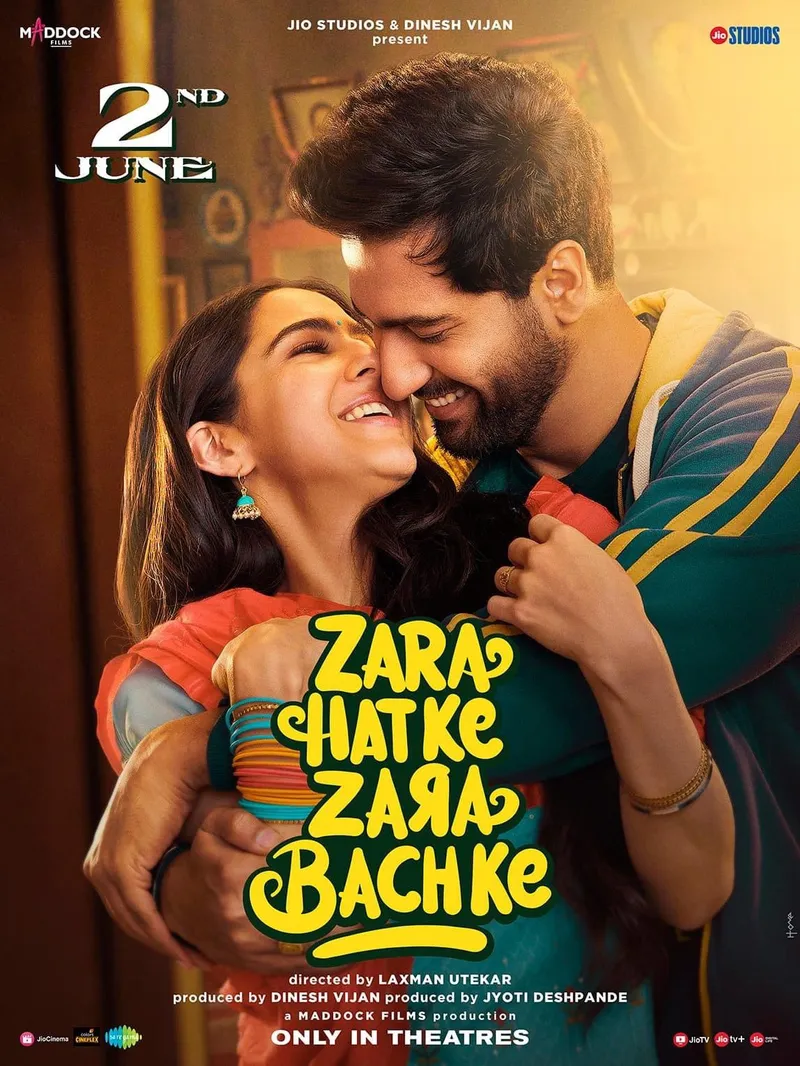Zara Hatke Zara Bachke resonates with its story, but over-does the filmy drama
A love-struck couple’s decision to go beyond legal means to buy a home of their own makes for a relevant middle-class struggle, but Zara Hatke Zara Bachke could have benefitted from less melodrama.
Starring: Sara Ali Khan, Vicky Kaushal, Sharib Hashmi, Sushmita Mukherjee, Akarsh Khurana
The dream of owning a home has eluded countless Indians for generations. It has also created space for good, engaging films that people can relate with. In one of his early films, Love Per Square Foot (2018), Vicky Kaushal had tackled the subject of the crisis of owning a home in Mumbai. In Zara Hatke Zara Bachke, his latest drama to hit theatres, this struggle morphs into deliberate fraud by a lovestruck married couple— Kaushal and Sara Ali Khan—who want to find an affordable home of their own.
Is this film in the league of say, Gharonda (1977) or Saath Saath (1982)? Not quite. But it has its relevance and resonance at a time when affordability is becoming a tough and illegal nexus and manipulation mar India’s home buying market.

Source: Twitter
Dahaad roars as a gripping crime thriller while droppings truths on gender, caste
Soumya Chawla (Khan) and Kapil Dubey (Kaushal) are a happily married, lovestruck middle-class couple living in a joint family. She works at a coaching centre with the owner having a soft spot for her, and Kapil works as a yoga instructor.
With a nagging relative and her family piling on to their small home, Soumya acutely feels the need for a home of their own. Buying an apartment of their choice in Indore is beyond their budget. When she discovers a government scheme to give out homes at a low cost, especially to women, she pushes her husband to find out more. They find out that they are ineligible for these flats. Unwilling to give up, Soumya hits upon a scheme to manipulate her way into this eligibility criteria, but this would need Kapil to sign up for a weird decision.
Convincing him to go along with her plan, much to the chagrin of both their parents, the couple borrow all they can to get this home. Eventually, their wish comes true, but it costs them their peace of mind. An unexpected incident makes them realise that some things are more important than a brick and mortar house.
Zara Hatke Zara Bachke is Laxman Utekar’s second outing as director, after the successful Mimi (2021). Co-written with Maitrey Bajpai and Ramiz Ilham Khan, it uses the standard set up of a cantankerous family where everyone mouths a random opinion, thereby complicating the lives of a young couple.
While most actors do justice to their parts, a touch of melodrama marks their performances. The context and tone of this story will fit in with mass audiences, for both the hero and heroine underdress and show up on screen like regular folk. It resonates because of its strong subject--buying a home is such a distant dream for so many. But the execution of this story is uneven, with ebbs and flows marking the entire narrative.
Soumya and Kapil are both likeable, especially their dynamic of Kapil’s tendency to save money while his wife likes to project that they have enough. There is little time or effort given to make their love story evolve and solidify during the story, which makes the audience care a little less for their characters. While the dialogues are accurate with the regional intonation and dialect of Indore, some of it feels a little dense.
There’s so much repartee and talking happening on screen that there’s little room to contemplate or invest in the leading pair’s emotions. For instance, a courtroom scene with a screaming, fist-banging lawyer and a jumpy judge simply doesn’t work. It could well have been made wittier with finessed writing and dialogues.
Having said that, the film has built upon a common Indian problem with an almost realistic setting, where struggles of income, cost of living, and familial strife all come together to pressurise the young married couple. Kaushal does a brilliant job of playing the husband desperately in love, but also aware of his financial limits. Khan has worked very hard, evidently, on this part, cutting down on the glamour quotient; in fact, she has tried a little too hard at some points.
The ensemble cast that includes Soumya’s loud Punjabi parents and Kapil’s Brahmin parents (including Akarsh Khurana, Sushmita Mukherjee, and Anubha Fatehpuria) deliver on their roles, but these characters pander to cliches. In achieving a mass appeal movie with laugh a minute tropes, this film compromises on emotional depth. It also has a rather unconvincing ending involving Sharib Hashmi as a watchman (Daroga Raghuvanshi) in a stand out example of convenient writing.
Some films have to be viewed from the lens of larger audience appeal. With spirited performances and a relevant issue at its heart, this film entertains for the most part. It is recommended to anyone that enjoys mainstream Hindi films.
Rating: 3/5
(The feature image has been sourced from IMDB)
Edited by Megha Reddy







